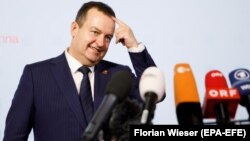European Union foreign ministers joined Germany in expressing concerns about a possible territorial exchange between Kosovo and Serbia, warning it could reignite age-old ethnic tensions.
"I don't want to lecture, but border changes have always brought new problems with them," Austrian Foreign Minister Karin Kneissl said on August 31 ahead of a ministers' meeting in Vienna.
Luxembourg's top diplomat, Jean Asselborn, echoed her comments, saying, "I'm warning against cutting things into pieces."
"That can have very...negative effects on other countries in this region…You have to be very careful here," he added.
Upon arrival in Vienna, German Foreign Minister Heiko Maas warned that territorial changes "can tear open too many old wounds in the population, and so we are very skeptical at this point."
The remarks came after German Chancellor Angela Merkel on August 14 warned against any border changes, saying the territorial integrity of the Western Balkan states was "sacrosanct."
The EU is brokering talks between Pristina and Belgrade to settle their dispute over Kosovo’s declaration of independence from Serbia in 2008 after a bloody war fought in the aftermath of the breakup of Yugoslavia in the 1990s.
Mainly ethnic Albanian Kosovo's independence left pockets of ethnic Albanians in Serbia, while ethnic Serbs are clustered in parts of Kosovo.
The controversial idea of a land swap and border changes that would more closely reflect ethnic populations was suggested in August by senior government officials in Kosovo and Serbia.
Kosovar President Hashim Thaci suggested a “correction of borders” that would involve unifying Serbia’s southernmost Presevo Valley region with Kosovo.
Ethnic Albanians form an overwhelming majority in the Presevo Valley, as well as in southern Serbia’s nearby regions of Bujanovac and Medvedja.
In return, some proponents have suggested Serbia would receive part of Kosovo’s northern Mitrovica region with an ethnic Serb majority.
Reflecting the sensitivity of the issue, the idea of a land swap is not unanimous even among leaders in the countries involved.
Kosovar Prime Minister Ramush Haradinaj on August 31 rejected Thaci's suggestion, saying any border changes would bring "new tragedies in the Balkans."
Some in the West, however, appear to leave the door open to a potential land swap.
On August 24, White House national security adviser John Bolton said that the United States would not oppose a territorial exchange -- provided Pristina and Belgrade work out a “mutually satisfactory settlement” between themselves.
And Belgian Foreign Minister Didier Reynders said on August 31 in Vienna that it was up to the two countries to decide on any changes.
"I believe it's up to them to establish what might be the elements of an agreement," he said.
"It's not up to the European Union to provide guidelines on what should be in it. We are trying above all to support their discussions," he said.
Serbian Foreign Minister Ivica Dacic said only that his country is committed to finding a compromise on issues dividing the Balkan neighbors, "but we're not sure yet when it is going to happen."
The countries' presidents are scheduled to meet again in Brussels on September 7 in further efforts to settle their differences, something the EU has set as a requisite to possible membership.








